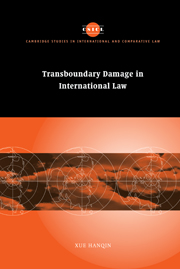Book contents
- Frontmatter
- Contents
- Foreward
- Preface and acknowledgments
- List of treaties
- List of cases
- List of abbreviations
- 1 Introduction
- Part I Accidental damage
- Part II Non-accidental damage
- Part III Damage to the global commons
- Part IV Underlying principles
- 8 The nature and basis of international liability
- 9 Conclusions
- Bibliography
- Index
8 - The nature and basis of international liability
Published online by Cambridge University Press: 22 July 2009
- Frontmatter
- Contents
- Foreward
- Preface and acknowledgments
- List of treaties
- List of cases
- List of abbreviations
- 1 Introduction
- Part I Accidental damage
- Part II Non-accidental damage
- Part III Damage to the global commons
- Part IV Underlying principles
- 8 The nature and basis of international liability
- 9 Conclusions
- Bibliography
- Index
Summary
Causing transboundary damage is referred to as an international tort by some jurists. Such descriptions apply terms and concepts of private law by analogy to international claims and jurisprudence. As is so often the case, however, legal rules and principles cannot stand on their own. They have to operate within the institutional framework in which they have developed. While legal theories on transboundary damage are evolving, international practice has not followed the same course as has been experienced in the private law field. To this day, cases where transboundary damage is settled by the application of the general principles of international law on State liability for cross-border damage are few and far between. Why there is such a discrepancy between theory and practice, and between private law and international law, is not merely a theoretical question. To say that States are interest-oriented and will tend not to assume binding obligations may be too simple an answer: States do undertake legal obligations in their international relations, including in the environmental field, as we have seen. On the other hand there is a marked reluctance to take the implications of their having done so to their “logical” conclusion, i.e. a general rule or principle of liability.
By taking three parameters – normativity, equity, and efficiency – as a point of departure, this chapter will analyse the subject, focusing on the policy aspects that have so affected the course of legal development on transboundary damage.
- Type
- Chapter
- Information
- Transboundary Damage in International Law , pp. 269 - 316Publisher: Cambridge University PressPrint publication year: 2003



